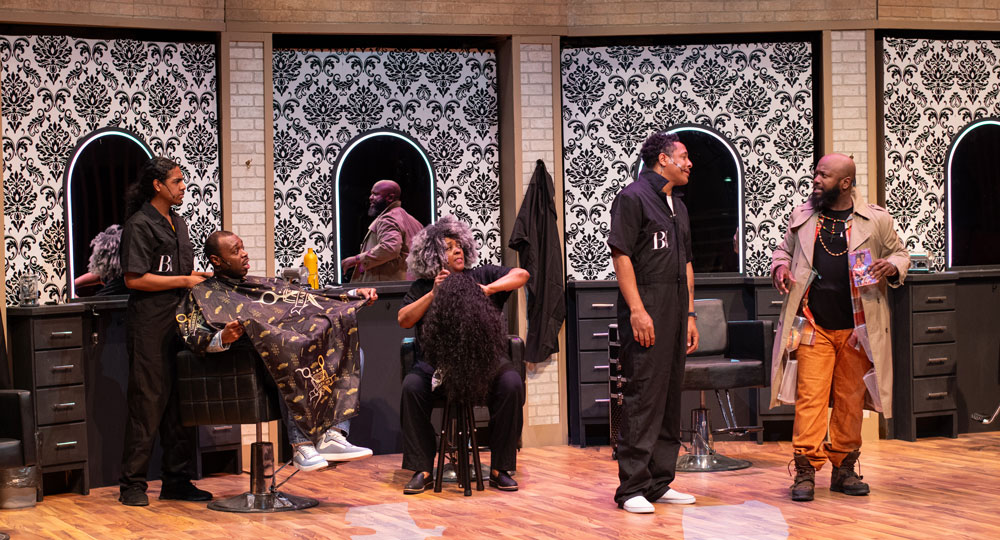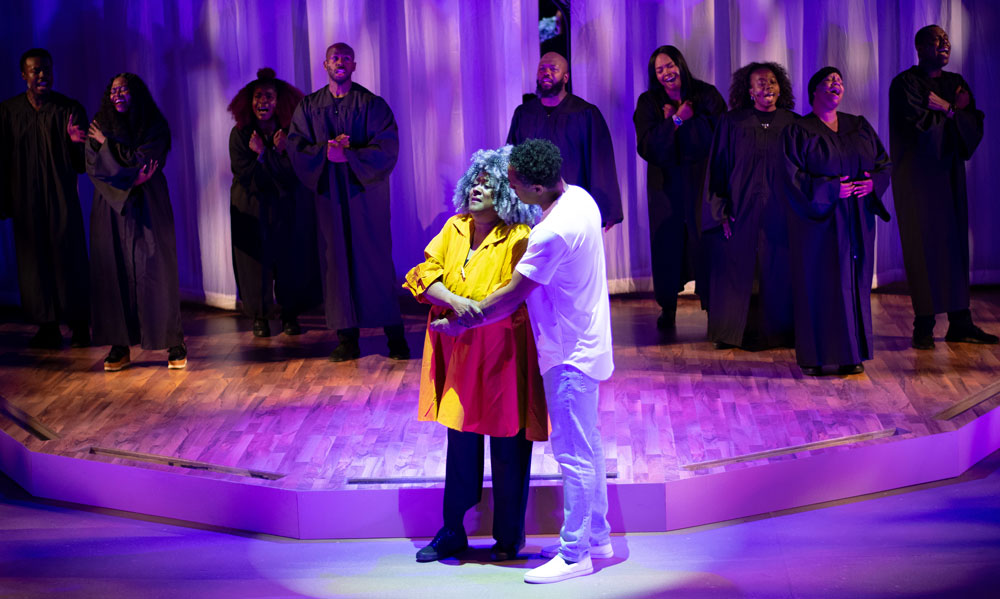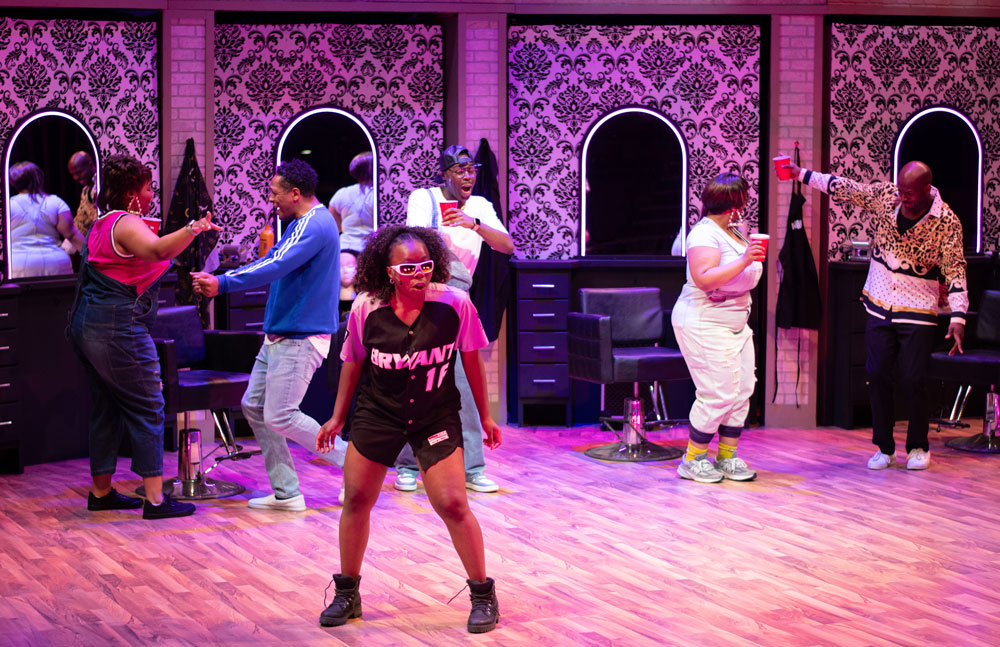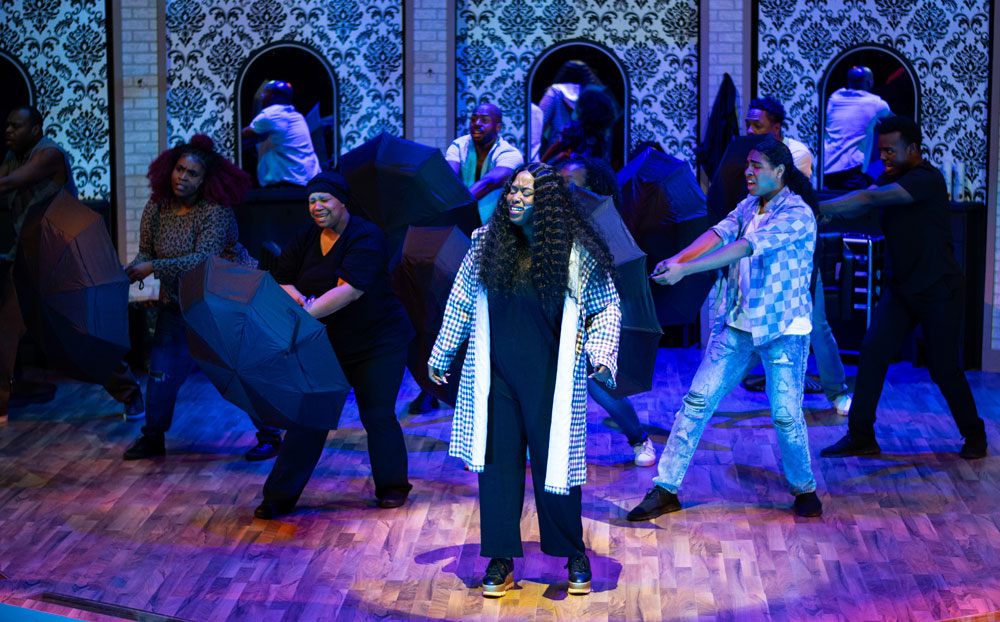
You’d be hard pressed to overstate the importance of legacy. Often it represents a lifetime devoted to a dream, a purpose or an ideal. And just as often, especially in minority communities, legacy symbolizes achievement. In Black Ensemble Theater’s (BE) The Salon, writer and director Michelle Reneé Bester pays tribute to a mainstay and important anchor within Black culture, the beauty parlor.
Some of what drives her desire to elevate and recognize the contributions of Black hair care establishments is personal. Her sister owned a hair salon; providing Bester an intimate knowledge of the hard work and sacrifice needed to ensure an enterprise prospers. As she shows in her homage to her sister and to Black hair, the people who frequent and work in these hives of beauty enhancement reflect the richness of community. Regardless of their personal history, they all maintain a common understanding of the pride derived from style-conscious grooming. By taking us inside Bernadette’s, The Salon aspires to export that appreciation to the larger world.
Despite there being no specific marker to confirm it, everything about Bernadette’s salon oozes with a big city feel. Initially, that sense of hyper-charged energy derives chiefly from Johnny (Vincent Jordan), who mans one of the four chairs in the salon. Throughout the centuries, men like Johnny have carried many monikers. Rake, ladies’ man, womanizer. In the Black community, he’s usually referred to as a player and this one, although proficient, isn’t very adept at managing his conquests.

The essence of reason and wisdom, Mama T (Cynthia Carter), may not own it, but she’s been running Bernadette’s for years. Working alongside Johnny for fifteen of them, and being forced to listen to the feeble or clumsy juggling he does with his lovers over the phone for more than a decade, leaves her perpetually dismayed at his treatment of women.
Monique (De’jah Jervai), another stylist and MJ (Jared Brown), the shop’s general assistant, round out the staff whose biggest headache is Big Bertha. Ancient and generally ignored, Bertha’s the water heater in the back of the shop. When finicky, she sounds like a renegade subway train rampaging through the middle of the salon.

With music at their core, no BE production is complete without song and The Salon uses it to add emphasis to its characters’ emotions or to respond to shifts in the storyline. Though the musical links here are not as strong as they often are in the company’s productions; they work well enough to add empathetic dimension to the cast’s struggles and triumphs. The first major challenge arrives when they learn the owner has sold the business. Sweeping in with the zeal of a Wall Street wolf, the new owner, Marie (Rose Marie Simmons), is more into revamping than purging and gives everything a cosmetic overhaul. The dated wall paper and storage cabinets get a sophisticated face lift and the stylists soon find themselves togged in natty black uniforms. Lots of rules get rolled out that begin with the word No. The changes are all swallowed more or less silently. But the introduction of a gay stylist, Erin (Makenzy Jenkins), goes much less well; especially for Johnny. Forced to the background because of mounting troubles with the salon, the tension between them is left to simmer.
The roster of characters bringing The Salon to life mirror those you’d find in your standard neighborhood hair care establishment. There’s the fast-talking guy who swings in selling everything from socks to Pepto Bismol from the lining of his trench coat. Dennis Dent as Hustleman provides a vibrant and energizing portrayal of this stock figure in urban neighborhoods. Carter, an actor who has a talent for injecting added doses of vitality and interest into her roles, reigns as the play’s moral core. Her Mama T is the center of gravity that gives this project its purpose and heart. Seeing more of the type of depth and shadings of interest she brings to her craft throughout this effort may have made the production more fulfilling. Or perhaps feeling there was stronger cohesion in the connections and bonds between the characters would have helped instill greater investment.

The exchanges between Johnny and Erin were opportunities to reveal unknown, unexpected or maybe even unwelcome truths about Black American culture’s posture on homosexuality. Erin’s firm embrace and defense of who he is certainly counts as laudable. The ambiguousness of his acceptance, at least on Johnny’s part, may be an accurate take on where the issue stands in the community.
Personal grievances get shunted to the side when all hands are needed to save the salon from closing. Big Bertha finally tanked and Marie doesn’t have the money to replace her. A Hail Mary pass in the form of a high-profile big jackpot hair styling contest becomes their single shot at survival. Architectural wonders, the resulting hair creations the crew designs for the competition dwarf anything even the most fertile mind might imagine.
Succeeding in portraying the unique environment in which Black hair studios exists, The Salon accomplishes the goal of nurturing an appreciation for their place in Black culture. As one of a select number of institutions that offer its clientele the opportunity to fully exhale in a place of welcome, the neighborhood hair salon is indispensable in the way it functions to sustain community.
The Salon
Through July 28, 2024
Black Ensemble Theater
4450 N. Clark Street
Chicago, IL 60640